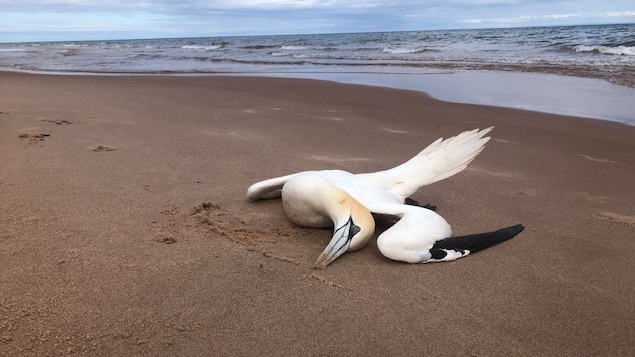The birds are mainly gannets. Bird flu was confirmed in 230 of them.
The likely death toll in the Gulf of St. Lawrence is several thousand birds, estimates Megan Jones, the Atlantic regional director of the Canadian Wildlife Health Cooperative and a professor at the Atlantic Veterinary College.
Gannets inhabit Bonaventure Island in the Gaspé by the thousands.
Photo: Radio-Canada / Josée Basque
—
The Prince Edward Island Fish and Wildlife Division, the Canadian Wildlife Service and Fisheries and Oceans Canada (DFO) also assisted in the cleanup efforts.
Gannets inhabit Bonaventure Island in the Gaspé by the thousands. They breed in densely populated colonies, which makes it easier for the virus to spread as the birds gather to nest in the spring.
Hundreds of sick and dead birds were also found on the beaches of the Acadian Peninsula, New Brunswick, and on the coasts of Cape Breton, Nova Scotia.
In unknown territory
So far, the sick or dead birds have been mostly gannets, but two common guillemots infected with avian flu during preliminary tests have been recovered from a beach in the eastern part of the province.
The virus has also been reported in double-crested cormorants in New Brunswick.
« We’re just trying to get an idea of what the numbers are, where they’re impacted, and what species are involved so we can at least keep track of what’s going on. »
Unfortunately, because the virus is in wild birds, there really isn’t much you can do.
she continued.
Bird flu can be a serious problem for farmers if it spreads from wild birds to domestic poultry.
It is difficult to know what path the bird flu will take in the Gulf of St. Lawrence, warned the specialist.
We are in uncharted territory here. This is new for our region
she lamented.
A northern gannet on Lamèque Island, in the Acadian Peninsula.
Photo : Radio-Canada / MARIO MERCIER
—
She reports that the virus does not survive as well in the environment when the temperature is hot. Ultraviolet light is also good for killing viruses, she says.
However, hopes of summer weather repelling the virus are thwarted by concern over conditions at the breeding colonies.
As the virus continues to spread, people who keep domestic birds are advised to avoid contact with wild birds.
According to a CBC report
–


/cloudfront-us-east-1.images.arcpublishing.com/prisaradiomx/TQF222C3LZGHRHHRUQ6B4YZLKI.jpg)